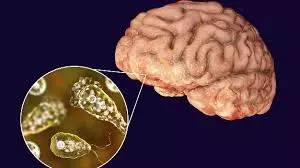Health
Kerala Launches Field Study to Combat Amoebic Encephalitis Surge

The Kerala Health Department, in collaboration with experts from the National Institute of Epidemiology in Chennai, has commenced a comprehensive field study aimed at investigating the causes of amoebic encephalitis, also known as amoebic meningoencephalitis. This initiative began in Kozhikode and will extend to the districts of Thiruvananthapuram, Kollam, and Malappuram. As of October 25, 2025, Kerala has recorded a troubling total of 30 deaths attributed to primary amoebic meningoencephalitis (PAM), a rare but often fatal condition caused by the Naegleria fowleri amoeba, colloquially referred to as the “brain-eating amoeba.”
The state has experienced an uptick in fatal cases, with Thiruvananthapuram reporting the highest number of fatalities at six. Despite the severity of this infection, Kerala’s proactive early detection measures have resulted in a mortality rate of 20-24%, significantly lower than the global average exceeding 95%.
Initiatives and Expert Involvement
In August 2024, a technical workshop brought together experts from various organizations, including the Indian Council of Medical Research (ICMR), the Indian Institute of Science, and the Kerala Pollution Control Board. This ongoing field study is a direct continuation of those discussions. Health Minister Veena George highlighted the state’s robust measures for treating and preventing amoebic encephalitis. She emphasized that effective interventions for early detection and specialized treatment have been crucial in managing the disease, which has a notoriously high global mortality rate of 99%.
The Health Department is actively urging individuals exhibiting symptoms of encephalitis to undergo testing for amoebic strains. During the August workshop, a special protocol for diagnosing and managing amoebic encephalitis was introduced for the first time. These measures have enabled early identification and treatment, ultimately saving numerous lives.
Infrastructure and Research Advancements
All medical colleges in Kerala are equipped with microbiology departments capable of detecting the presence of amoeba, facilitating prompt treatment for affected individuals. Notably, in June 2024, the Thiruvananthapuram Public Health Lab became the first facility in the state to establish a system for identifying amoeba species and confirming cases through molecular techniques. A similar system is in development at the IAV in Thonnakkal.
Previously, cases of amoeba-related encephalitis were confirmed only at PGI Chandigarh, but with local capabilities now in place, the state has significantly improved its treatment and research efforts regarding this disease.
Prevention Strategies
As part of the initiative to combat amoebic encephalitis, health officials have provided guidance on preventive measures that can be adopted by the public. These include:
– Avoiding diving or jumping into stagnant or untreated water bodies.
– Using a nose plug or covering the nose with fingers while swimming or diving.
– Keeping heads above water when swimming in untreated water.
– Refraining from disturbing mud in water-related activities.
– Ensuring that swimming pools, water parks, and spas are clean and well-maintained.
– Avoiding water from hoses or sprinklers entering the nose.
– Never using unboiled or unpurified water in the noses of children or adults.
– Preventing untreated water from entering the nose while bathing or washing the face.
– Keeping water bodies free from contaminants and waste.
– Cleaning water storage tanks thoroughly every three months.
– Advising immunocompromised individuals to use only purified water for wound cleaning.
Through these coordinated efforts, Kerala aims to mitigate the impact of amoebic meningoencephalitis and enhance the overall health safety of its residents.
-

 World5 months ago
World5 months agoSBI Announces QIP Floor Price at ₹811.05 Per Share
-

 Lifestyle5 months ago
Lifestyle5 months agoCept Unveils ₹3.1 Crore Urban Mobility Plan for Sustainable Growth
-

 Science4 months ago
Science4 months agoNew Blood Group Discovered in South Indian Woman at Rotary Centre
-

 World5 months ago
World5 months agoTorrential Rains Cause Flash Flooding in New York and New Jersey
-

 Top Stories5 months ago
Top Stories5 months agoKonkani Cultural Organisation to Host Pearl Jubilee in Abu Dhabi
-

 Sports4 months ago
Sports4 months agoBroad Advocates for Bowling Change Ahead of Final Test Against India
-

 Science5 months ago
Science5 months agoNothing Headphone 1 Review: A Bold Contender in Audio Design
-

 Top Stories5 months ago
Top Stories5 months agoAir India Crash Investigation Highlights Boeing Fuel Switch Concerns
-

 Business5 months ago
Business5 months agoIndian Stock Market Rebounds: Sensex and Nifty Rise After Four-Day Decline
-

 Sports4 months ago
Sports4 months agoCristian Totti Retires at 19: Pressure of Fame Takes Toll
-

 Politics5 months ago
Politics5 months agoAbandoned Doberman Finds New Home After Journey to Prague
-

 Top Stories5 months ago
Top Stories5 months agoPatna Bank Manager Abhishek Varun Found Dead in Well









